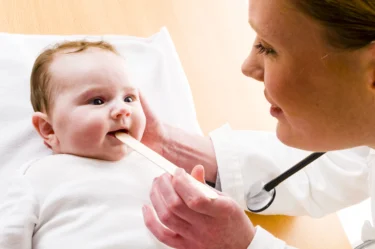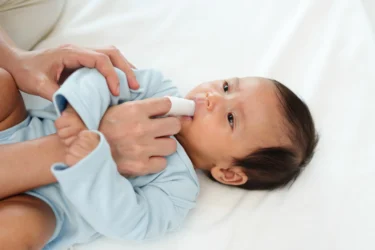Oral Thrush in Babies: Why It Happens and How to Manage It Safely at Home
By Dr. Anmol Batra +2 more

Get,

to manage your symptom
Get your,


4 Cr+ families
benefitted

OTP sent to 9988776655



You’ve successfully subscribed to receive
doctor-approved tips on
Whatsapp

Get ready to feel your best.

Hi There,
Download the PharmEasy App now!!


Register to Avail the Offer
Send OTPBy continuing, you agree with our Privacy Policy and Terms and Conditions

Hi There,
Sign up on PharmEasy now!!
Trusted by 4 crore+ families

OTP sent to 9988776655



You have unlocked 25% off on medicines




Code: NU25
By Dr. Anmol Batra +2 more
Table of Contents
As a parent, noticing white patches inside your baby’s mouth can be bothersome, but don’t worry! In most cases, it is just a fungal infection known as oral thrush, which is quite common and manageable1.
Oral thrush happens when the delicate balance of microorganisms in their mouth is disrupted, allowing the Candida (yeast) to grow more than it should. The good news? With gentle care and a few safe home remedies (and medical guidance when needed), your baby’s mouth will be back to normal in no time2.

In this article, we will help you understand why oral thrush in babies happens, what signs to look out for, and how to get rid of oral thrush safely at home, so you can feel calm and confident while caring for your little one.
Oral thrush in babies is a common yeast infection that affects the tongue and the inside of the mouth. As mentioned earlier, it is caused by an overgrowth of a fungus called Candida albicans, which normally lives harmlessly in the mouth in small amounts. When the balance of microorganisms is disturbed, for example, due to antibiotic use, weakened immunity, prolonged parental nutrition or certain medications like steroids, Candida could multiply and lead to visible white patches or redness in the mouth1. In babies, this condition is quite common because their immune systems are still developing.
Thrush may also occur around the nipples of breastfeeding mothers, as the infection may pass back and forth between the baby’s mouth (oral thrush) and the mother’s nipples (nipple thrush)3.
Common oral thrust causes include:
Note: The same yeast that causes oral thrush in babies may also lead to a diaper rash (causing diaper thrush) if it spreads through the baby’s stool.
Oral thrush in babies can manifest in various ways. Some babies may be fussy or have trouble feeding, while others may not seem bothered at all. Here is what to look out for:
While oral thrush in babies can look concerning, it is usually mild and treatable. Therefore, recognising these early signs can help ensure quick, gentle care for both mother and baby.
In most cases, your doctor can diagnose oral thrush just by looking at your baby’s mouth and tongue3. If they suspect oral thrush, they may gently take a small sample of the white coating using a sterile cotton swab and send it to a laboratory for testing and confirmation2.
In cases when the infection does not improve with treatment or seems unusual, your doctor may suggest further evaluation to rule out other oral thrush causes. In more complex cases (especially in older children or adults), tests done include1:
For babies, though, thrush is typically a simple, visible diagnosis, and with the right care, it clears up quickly.
Oral thrush usually does not cause any serious health problems, especially in healthy babies. However, if left unaddressed or if the immune system is weak, it may sometimes lead to further issues such as2:
Oral thrush is usually mild and clears up quickly with the right care.
Oral thrush baby treatment focuses on easing your baby’s discomfort, stopping the infection from spreading, and preventing it from coming back. Both the baby and mother should be treated at the same time, even if only one shows symptoms. This will help avoid re-infection during breastfeeding1,3.
If you are wondering how to get rid of oral thrush, let us see the common available options:



Continue breastfeeding, as it is safe and helps maintain bonding and nutrition. In addition to this, try out these simple measures to ease the condition at home:
If symptoms do not improve within a week or if pain worsens, speak to your doctor or a breastfeeding specialist. Remember, with the right care, both you and your baby will feel better soon.
While it may not always be possible to completely prevent oral thrush, certain hygiene and care measures can reduce the risk of infection and recurrence:
Also Read: Baby Loose Motion: Causes, Home Remedies, and Effective Ways to Stop It Fast
You should contact your doctor or paediatrician if6,8:
It is especially important to seek medical advice if your baby is less than 6 months old, premature, or has a weakened immune system, as infections can spread more easily in these cases.
Also Read: 11 Signs of Type 1 Diabetes in Children You Must Not Ignore
Oral thrush is a common fungal infection in babies, usually caused by Candida albicans. While it is rarely serious, it can cause discomfort, feeding difficulties, and irritation for both the baby and the breastfeeding mother. Thus, prompt recognition and appropriate oral thrush baby treatment with antifungal medication, along with good hygiene and sterilisation practices, can help clear the infection effectively.
To prevent thrush, follow steps such as cleaning feeding equipment, pacifiers, and maintaining oral hygiene. This can help reduce the risk of recurrence. Remember, with timely care and attention, most cases of oral thrush resolve quickly without complications.
Also Read: Rickets in Children: Causes, Symptoms, Types & Treatment
Yes, oral thrush may be passed between a baby and their mother during breastfeeding. The yeast (Candida albicans) could spread from the baby’s mouth to the mother’s nipples and vice versa1,3. It is therefore important that both mother and baby are treated at the same time to prevent reinfection.
Antibiotics could upset the natural balance of bacteria in the body by killing “good” bacteria that normally keep yeast under control. This allows Candida to grow more easily in the baby’s mouth, leading to thrush3.
In most cases, thrush is mild and does not make babies seriously ill. However, it can cause discomfort, make feeding painful, and sometimes lead to fussiness or poor feeding. In very rare cases, especially in babies with weakened immune systems, the infection can spread and cause more serious illness2.
Sometimes mild cases of thrush may clear up on their own within a few days. However, most babies need antifungal treatment to get rid of the infection completely and prevent it from spreading or recurring1,2. Thus, it is best to consult your doctor for proper diagnosis and treatment.
Disclaimer: The information provided here is for educational/awareness purposes only and is not intended to be a substitute for medical treatment by a healthcare professional and should not be relied upon to diagnose or treat any medical condition. The reader should consult a registered medical practitioner to determine the appropriateness of the information and before consuming any medication. PharmEasy does not provide any guarantee or warranty (express or implied) regarding the accuracy, adequacy, completeness, legality, reliability or usefulness of the information; and disclaims any liability arising thereof.
Links and product recommendations in the information provided here are advertisements of third-party products available on the website. PharmEasy does not make any representation on the accuracy or suitability of such products/services. Advertisements do not influence the editorial decisions or content. The information in this blog is subject to change without notice. The authors and administrators reserve the right to modify, add, or remove content without notification. It is your responsibility to review this disclaimer regularly for any changes.
Comments

Leave your comment...
You may also like
Comments